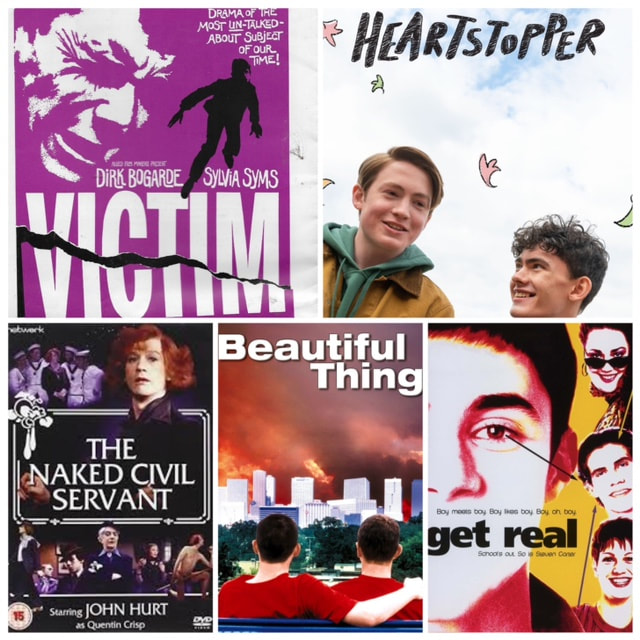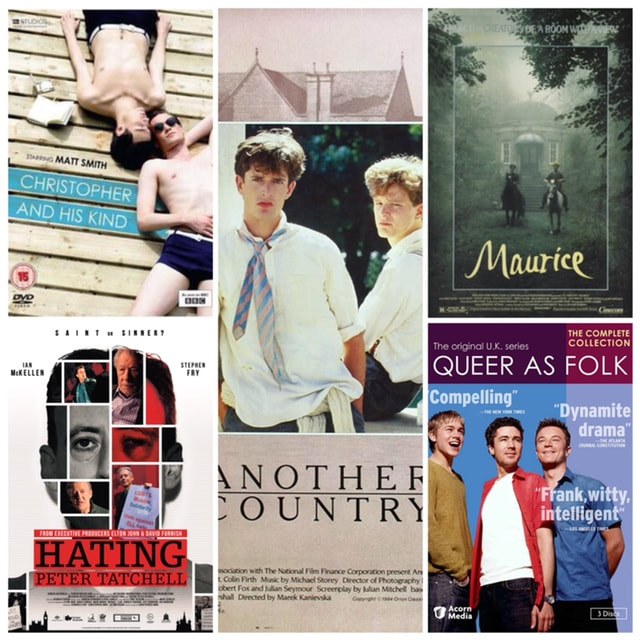|
We're halfway through Pride Month and as it is 50 years since the first UK pride, I got to thinking about some of my favourite British LGBTQ+ films/ programmes. This is by all means not a definitive list and I am sure I could name more but in the interest of starting a conversation, here are 10 of my favourites in no particular order of preference.
1. Heartstopper: This current Netflix series is centred on Charlie, a recently outed teen and his growing relationship with Nick, a bisexual boy in his school. Set at an all boys school, the show deals with their respective group of friends and the drama that ensues when their relationship becomes known. Coming out is the overall theme in the series and as it has been renewed for another two seasons; I'm looking forward to seeing how the characters and storylines develop from there because as we know, coming out is only the beginning. 2. Beautiful Thing: This film adapted from Jonathan Harvey's 1993 play stole our hearts in 1996. Set on the Thamesmead Estate in SE London, it follows Jamie & Ste who's growing awareness and blossoming love is chronicled during one of London's hottest summers. It is one of the first major LGBTQ+ films of the 90's that did not have an underlying storyline that involved HIV/ AIDS or death. Doesn't seem like much but ground breaking in itself. 3. Get Real: Another play adapted into a film, which sadly did not receive the same accolades that Beautiful Thing did. Both films dealt with teenage sexual awakening but were two different types of story and had they been treated as such, perhaps it would have been better received. In this film, Steven is aware of his sexuality but not out. He spends his school days lusting over John, the popular kid at school and star athlete. After school he looks for hook ups to satisfy his awakening sexual appetite. When the two run into one another outside of school, it sets off a chain of events that will change both of their lives. 4. The Naked Civil Servant: Adapted from the memoirs of Quentin Crisp, and starring John Hurt, this film takes us through the early days of Quentin's life in London and filled with the witticisms and observations that would come to define his work. 5. Victim: This 1961 film was the first English language film to use the word "homosexual." Dirk Bogarde stars as a respected lawyer who falls prey to a blackmailer because of his affair with a young builder; as well as the fallout from it. It was ground breaking at the time and began a conversation about the crimes that were created as a result of homosexuality being illegal, particularly blackmail. I recently shared a piece I had written about this film which can be read here. 6. Hating Peter Tatchell: This documentary is a must see for any LGBTQ+ worldwide but in particular those of us here in the UK. Peter has devoted his life and sacrificed his own health and safety for the cause of LGBTQ+ equality and human rights around the world. Aptly titled, he remains a controversial figure but like activists' such as Larry Kramer, we must acknowledge that it is their tenacity and fierce approach that has been needed to press the accelerator on LGBTQ+ equality. You don't have to like him, but you need to respect him. 7. Christopher and His Kind: This BBC production stars Matt Smith as Christopher Isherwood and is based on the book of the same name. In this adaptation, we follow Christopher to Berlin in the last days of the Weimar Republic, his relationship with a young German whom he tries to help escape Germany and their reunification after the war in a divided Berlin. Isherwood's few years in Berlin would inspire the musical Cabaret and although he would spend the rest of his life in California, his Berlin years would come to define his literary work. 8. Maurice: Starring James Wilby as the title figure and Hugh Grant as his love interest. What makes Maurice such an important work is that E.M. Forester wrote the original novel in 1913-14 and later revised it with explicit instructions that it be not published until after his death. It chronicles the life of Maurice Hall and his homosexuality as reflected in early 20th Century England. Forester wanted the book to have a happy ending and wrote it as such. This put him at odds with the law but nevertheless he gave Maurice, the ending in which two men could be happy together. That love could exist between two men even when the odds were against them. 9. Another Country: Based on the life of Guy Burgess, one of the Cambridge Five, it stars Rupert Everett & Cary Ewes as well as Colin Firth. Told in reverse from Guy's exile in Moscow after being outed as a Russian spy, it exposes the cruelty, coldness and hypocrisy of the British public school system. It was also the first ever LGBTQ+ film I ever watched, one late night on PBS. I had never seen two men embrace in a film until then and it stuck with me. 10. Queer As Folk: This series is now on its second reincarnation in the form of another US adaptation but in this moment, I am referring to the original. I don't think there is a single person who can't remember the premiere episode that follows a group of friends in Manchester who are living, loving and fucking their nights away. I wrote a piece last year about it for Gay Life Manchester which you can read here. I wrote a piece last year for Gay Life Manchester Magazine on this show’s enduring popularity which can be read here. So not a definitive list but a start, what are your favourite UK LGBTQ+ films and programmes? Share them in the comments, on social media or feel free to message with them. Happy Pride Everyone!
0 Comments
Leave a Reply. |
AuthorJohn Lugo-Trebble considers this more of a space to engage personal reflections and memories with connections to music and film. Archives
November 2023
Categories |
Proudly powered by Weebly


 RSS Feed
RSS Feed